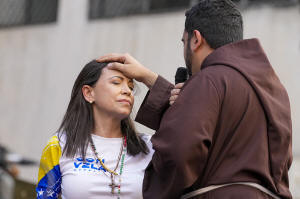Venezuela's opposition supporters grapple with hope and disappointment
after Maduro is sworn in
 Send a link to a friend
Send a link to a friend
 [January 11, 2025]
By REGINA GARCIA CANO [January 11, 2025]
By REGINA GARCIA CANO
CARACAS, Venezuela (AP) — The inauguration of Venezuelan President
Nicolás Maduro left his opponents to grapple with with conflicting
feelings of hope and disappointment on Saturday, pondering why the
self-described socialist leader could not be stopped despite credible
evidence that he had lost the election last year.
Some described their mood after Friday's ceremony at the legislative
palace in Caracas, Venezuela's capital, like an emotional hangover while
others said they feel abandoned.
Many expressed cautious optimism, finding a measure of comfort in the
social media videos released by two opposition leaders — popular former
lawmaker María Corina Machado and Edmundo González, the opposition's
candidate in the vote — who had promised to topple Maduro.
“In the end, it feels as if the soup got cold,” college professor Nelson
Perez said. “We’ve been on the subject of not losing hope for a while.
... But then you realize it’s more of the same.”
That realization is hard to process for millions of Venezuelans who,
like Perez, had imagined a different Jan. 10 — one with González
receiving the presidential sash and Machado giving one of her signature
fiery speeches before the National Assembly.
Instead, González and Machado sent messages on social media while Maduro
placed his hand on Venezuela’s constitution and took the oath of office,
defying overwhelming evidence contradicting his victory claim in the
July presidential election.

Maduro compared himself to a biblical David fighting Goliath and accused
his opponents and their supporters in the United States of trying to
turn his inauguration into a “world war.” He said his enemies’ failure
to block his inauguration to a third six-year term was “a great victory”
for Venezuela’s peace and national sovereignty.
“I have not been made president by the government of the United States,
nor by the pro-imperialist governments of Latin America,” he said after
being draped with a sash in the red, yellow and blue of Venezuela’s
flag. “I come from the people, I am of the people, and my power emanates
from history and from the people."
Venezuela’s National Electoral Council, stacked with government
loyalists, had declared Maduro the winner of the July 28 election. But
unlike in previous contests, electoral authorities did not provide
detailed vote counts to back the announced result.
The opposition, however, collected tally sheets from 85% of electronic
voting machines and posted them online — showing its candidate, González,
had won by a more than a two-to-one margin. U.N. experts and the
U.S.-based Carter Center, both invited by Maduro’s government to observe
the election, said the tally sheets published by the opposition are
legitimate.
Machado, in a message on social media Friday, said Maduro was guilty of
a coup by not leaving office by Jan. 10, when by law, Venezuela’s
presidential term begins. She also said she was confident that the
country’s “freedom is near” but stopped short of saying anything about
future steps the opposition could take to end Maduro’s presidency.
[to top of second column]
|

A priest blesses Venezuelan opposition leader Maria Corina Machado
during a rally against President Nicolas Maduro the day before his
inauguration for a third term, in Caracas, Venezuela, Thursday, Jan.
9, 2025. (AP Photo/Ariana Cubillos)

“Today, Maduro didn’t put the sash on his chest. He put a shackle on
his ankle, which will tighten every day,” she said.
A day earlier, Machado — who was banned from running for office but
remains the driving force behind Venezuela’s beleaguered opposition
— had emerged from months of hiding to join an anti-Maduro protest
in Caracas. She said security forces had briefly detained her after
leaving the rally, an allegation the government promptly denied.
Thursday’s rally drew far smaller crowds than the massive
demonstrations Machado and González had led during the election
campaign, primarily because of fears over the government's brutal
crackdown on dissent. More than 2,000 people were arrested during
and after the civil unrest that followed the election.
“You see people, and they look like they have a hangover,”
bricklayer Luis Carlos Moreno, 55, said of the mood among those who
had stayed away from the inauguration ceremony. “We have to wait
until next week to see how things go and if … everyone goes to work
and the kids go to school.”
In contrast, Maduro’s supporters near the legislative palace were
jubilant, some unable to hold back tears of joy.
State TV said 10 heads of state attended the ceremony. But far more
governments around the world have rejected Maduro's victory claims,
pointing to credible evidence validated by election observers.
Underscoring Maduro’s growing isolation, the U.S., Canada, Britain
and the European Union announced new sanctions Friday on more than
20 Venezuelan officials, accusing them of gutting the country's
democracy. Those sanctioned included Supreme Court justices,
electoral authorities, the head of Venezuela’s state oil company and
Cabinet ministers.
Meanwhile, González, who left for Spain in September to avoid
arrest, was in the Dominican Republic, which was supposed to the
last stop on his tour of the Americas before attempting to return to
Venezuela to be sworn in. In his video message, he told supporters
that Maduro’s government will end “soon, very soon” and reiterated
his promise to return to Venezuela.

“I am ready for safe entry at the right time,” he said.
Those struggling with the idea of Maduro's rule for six more years
included poll workers — many of them were harassed or arrested
following the election.
“I'm very disappointed,” said Caracas resident and poll worker
Marlyn Ruiz. “Reality is not as we were led to believe.”
All contents © copyright 2024 Associated Press. All rights reserved |